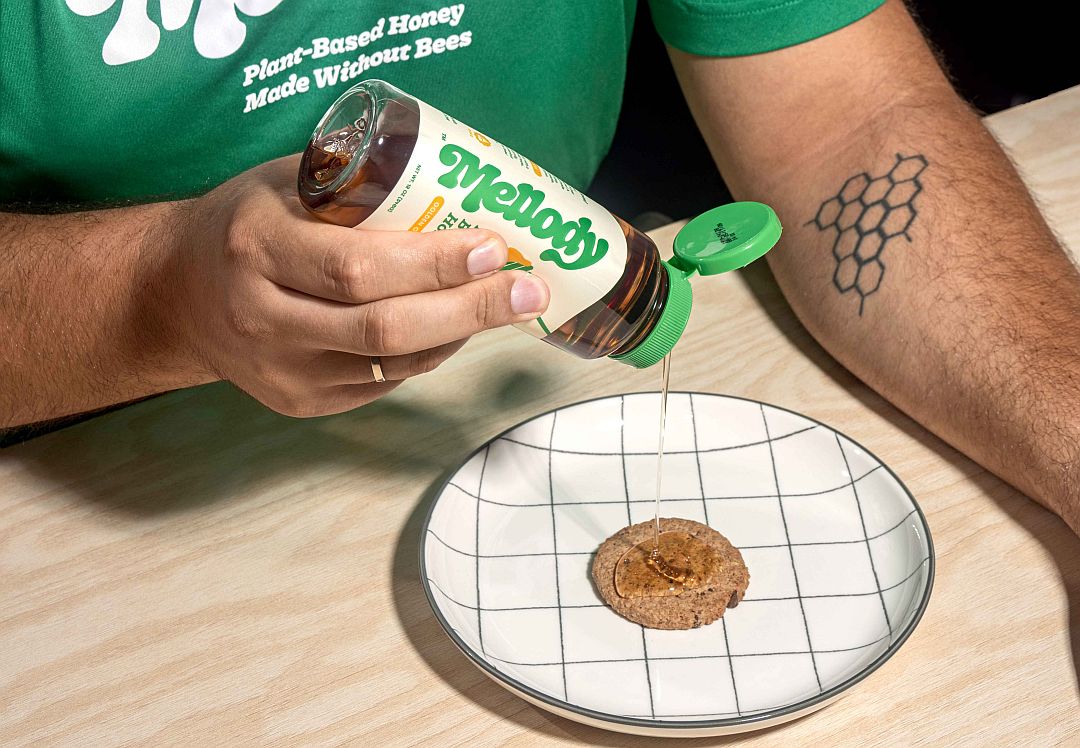MeliBio, a California-based startup developing honey without bees, says it is on course to reach profitability by the year end as it ramps up sales in the US market.
“In 2024 we went from 10 stores to 400, and to get to profitability we need to graduate to between 1,500 to 2,000 locations,” cofounder and CEO Darko Mandich told AgFunderNews.
“But what’s really cool is that we are now seeing interest everywhere from Florida to Minnesota as well as cities such as L.A., New York, and San Francisco,” added Mandich, a Serbian entrepreneur and honey-enthusiast who teamed up with molecular biologist Dr. Aaron Schaller to create MeliBio in 2020.
“We see great potential as honey sales in the US surpassed $1 billion last year and have seen double-digit growth over the past few years as people are looking for alternatives to white table sugar but also to some of the alternative sugars that don’t sound natural.”
MeliBio’s first commercially-available product—sold under the Mellody brand in the US—contains 80% fructose and glucose and 18% water, but gets its distinct flavor and properties from a blend of plant extracts comprising the remaining 2% (red clover, jasmine, passionflower, chamomile, and seaberry, coupled with gluconic acid and natural flavors).
The next generation of products will feature enzymes—made by microbes in fermentation tanks—that bees use to convert nectar into honey, which will deliver a product that is far closer nutritionally, to honey made by bees, said Mandich.
“A 100% plant-based approach doesn’t work for all types of honey,” added Mandich, who picked up the top prize ($15,000) at Ajinomoto Health & Nutrition’s NGT3 (Next Generation Taste & Technology Technologies) pitch slam in Ithaca, IL, last week.
“We’ve already built a CPG business that has real customers and very attractive margins, with lots of room to grow, but we are still betting that the precision fermentation route will allow the VC returns that we are working towards.”

European operation ‘on the backburner’
However, it hasn’t all been plain sailing for the company, said Mandich, who said 2024 was “personally the most difficult year of my career.”
There has also been a change of focus, with a partnership that MeliBio had set up with Slovenian food maker Narayan to introduce its wares to the UK, Switzerland, and Austria under a variety of private label brands now “on the backburner,” he explained.
“We had a lot of learnings from the partnership with Narayan [which is being acquired by indoor ag specialist Edible Garden], but we realized over time that focusing on the US, where we can control the entire supply chain, just made much more sense for us. We increased US revenues seven-fold in 2024 vs 2023.
“Narayan has many products in its portfolio, and we are just one of them, meaning that for us, we don’t get the same kind of attention as we do when we control the entire value chain ourselves.”
The Mellody product in the US is being sold in foodservice, retail, and as an ingredient offered to other companies, he explained.
“People like the fact that it is manufactured domestically and we have distribution through several partners now including KeHE, UNFI, and Performance Foodservice. Right now, we have about 10 distributors in the US spread between national and regional players.”
Is there a market for bee-free honey?
But what’s the attraction of bee-free honey? Is this a solution looking for a problem?
While MeliBio initially talked a lot about ethics and sustainability, picking up interest from vegan restaurants and retailers, the most compelling argument for bee-free honey reflects simple economics, argues Mandich. Put simply, he says, demand for honey is rising and honey bee populations are declining due to viruses, parasites, bacterial and fungal pathogens, and climate change, creating an opportunity for alternatives.
“By the end of 2024 we were actually under the price of American honey, which made our product relevant to a lot more customers.”
Some of that is through economies of scale, he says, but the firm has also been able to reduce operational costs by “replacing some of the functions that have been done by humans” with AI-based tools. “While you and I are having this call, AI agents are finding leads, reaching out to leads, offering samples, and then triggering those samples to be sent from our system.”
There are also well-known challenges around economic adulteration in the honey market, he added: “The US is increasingly reliant on imported honey and people aren’t sure what they’re buying; they suspect they’re buying a blend containing some real honey and a lot of bulking agents because some of the prices [are too good to be true]. Give us a year or two and we’re going to be the most affordable way to get honey in the US. We might become among the first few foodtech companies that are not going to be reliant on VC funding.”

Fundraising challenges
So how are investors viewing MeliBio, which has a CPG business selling plant-based honey, but also has a biomanufacturing operation producing enzymes that could transform that product into something much more closely replicating the real thing?
According to Mandich: “The precision fermentation platform can make ingredients we can use to make our plant-based honey even better but also make standalone ingredients that traditionally come from bees for nutraceuticals and cosmetics, and we have various potential customers that we might do a strategic collaboration or agreement with on that front.”
Investors, however, are not always sure how to value the company, he said. “For some CPG investors we’re too sciencey, but then some more deep tech investors see that we have a plant-based product in the market and like to slap a CPG label on us.”
While MeliBio should break even in due course from plant-based honey sales and running an extremely lean CPG operation, he said, it will need additional funding to secure regulatory approvals and scale its fermentation business, although the plan is to do this with partners rather than in-house. But as the inclusion rates for the enzymes are very low, the company will not need huge bioreactors, stressed Mandich, who has raised around $10 million to date.
“We’re partnering with companies such as [continuous fermentation expert] Pow.bio to work on larger bioreactor runs while we retain the IP around our products.”





